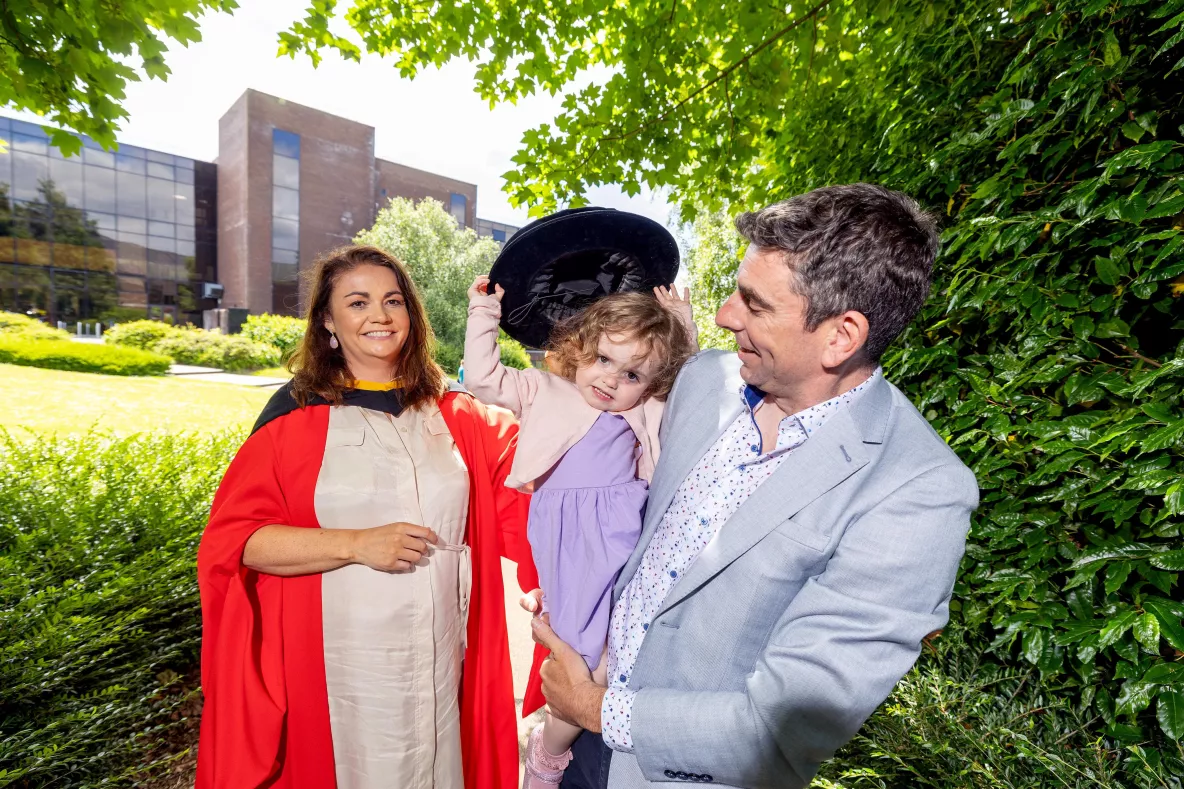

An award-winning journalist and University of Limerick lecturer has urged the next generation of reporters to put down their phones and dip out of the social media wave, in the face of the growing ‘global’ problem of misinformation.
Audrey Galvin spoke ahead of her graduation from University of Limerick this week, where she was conferred with a PhD in Philosophy from the Faculty of Arts, Humanities and Social Sciences.
The newly minted Dr Galvin, who is a lecturer in journalism at UL, joined over 1,200 students being conferred this week as part of the University’s Summer Conferring Ceremonies.
Originally from the village of Finuge in Co. Kerry, Audrey was a “voracious reader” growing up and completed her undergraduate degree in English and History. Pursuing her passion for storytelling, Audrey obtained a master’s degree in media and spent over a decade working as a radio broadcast and multimedia journalist with Radio Kerry.
“I covered everything from general and European elections to murder trials, to hearing about people’s vexations with hedges and potholes – such is the variance of stories in rural Ireland. I think I quickly developed a good nose for a story, and the Kingdom is not short of storytellers,” said Audrey.
Audrey developed an interest in radio documentaries early in her career and has gone on to enjoy success in the space. In 2015, her radio project ‘The Silent Wounded’, focusing on the untold stories of people with acquired brain injury (ABI), won a gold award from the prestigious New York International Radio Festivals.
“What I uncovered from my research, before I met with the people who were central to the story, was a group who were often paid lip-service, spoken to rather than included in a conversation about who they are and what they want from life,” recalled Audrey.
“The participants and their families gave incredibly powerful accounts of their experience as people with ABI, and their loved ones who care for them.”
While ‘The Silent Wounded’ was critically acclaimed, for Audrey – as with any other project she undertakes, her focus lay in the power of the story and its impact on those listening and involved.
“I am interested in people’s lived experience, how they cope with adversity and challenges in their lives – I think that’s where the power of a story lies,” said Audrey.
“I always tell students: a story should affect the head, the heart or the pocket, or it won’t resonate with people.”
When it comes to educating and mentoring the next generation of journalists, Audrey acknowledged that they face many serious challenges.
“I would like for them to not rely too much on social media and their phones – you need to get out and meet people. Of course, social media is a fantastic and integral tool for journalists, but it has its place; the story comes first, and people are integral to that.
“I also think mis- and disinformation are major challenges to the work of journalists. They work under considerable time pressures, and their ability to verify information can be considerably compromised by misinformation and deliberate spread of lies to suit a preferred narrative. I think it is a growing global issue.”
Alongside her lecturing, Audrey also works with Coimisiún na Meán, assessing applications under their Sound and Vision programme, and will also serve as a judge in this year’s National Radio Awards. One might ask Audrey, a busy mother-of-three with a packed schedule, what motivated her to commit to returning to education to pursue her PhD; for her, it was a drive to continue exploring how hard-hitting social issues are represented by the media.
“My research centres on how the media represent cases of murder-suicide. This looked at not only how the media can direct us on what to think about these issues, but I also spoke to journalists about their experience of writing about such cases,” explained Audrey.
“Some of the problematic representations focused on pointing to mental health or financial debt as a reason for the murder of a wife or children, and failure to call them extreme cases of domestic violence.
“In a lot of cases, journalists were unaware that they were pointing to a specific reason as to why the murder-suicide occurred, which I think is one of the more powerful findings of the thesis.”
Looking ahead, Audrey’s hope is to continue along her research path; she also has exciting plans within her role at UL, including working on a new multiplatform journalism module.
One thing is for sure – Audrey won’t be hanging up her radio hat any time soon.
“I always have ideas in my head for news stories and projects that I think the students can work on. I like collaborative efforts, whether they be working on highlighting new road safety research undertaken at UL or hearing from members of our migrant community and building a rapport which emboldens them to tell their story.”
When it comes to encouraging our reporters and documentarians of the future, curiosity is at the heart of Audrey’s advice to ‘go outside of their comfort zone’.
“I think curiosity is one of the bedrocks of journalism; if you aren’t curious, then you are not interested. Good journalists are always asking questions and finding new angles on a story.”
Email: ahss@ul.ie
Phone: +353-61-202700
Postal Address: AHSS Faculty Office, University of Limerick, Limerick, Ireland.